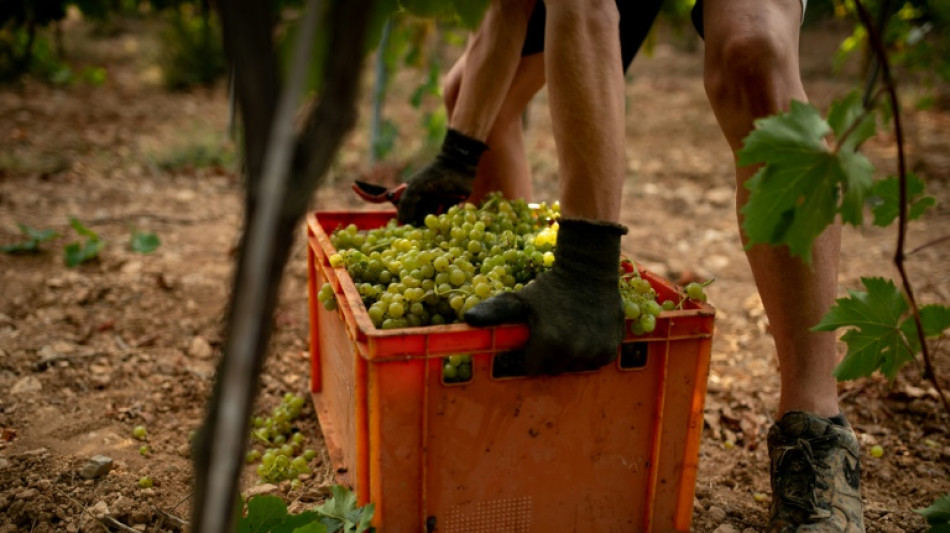
-
 Sabalenka fires Australian Open warning with Brisbane domination
Sabalenka fires Australian Open warning with Brisbane domination
-
In Gaza hospital, patients cling to MSF as Israel orders it out

-
 New protests hit Iran as alarm grows over crackdown 'massacre'
New protests hit Iran as alarm grows over crackdown 'massacre'
-
Svitolina powers to Auckland title in Australian Open warm-up

-
 Keys draws on happy Adelaide memories before Australian Open defence
Keys draws on happy Adelaide memories before Australian Open defence
-
Scores of homes razed, one dead in Australian bushfires

-
 Ugandan opposition turns national flag into protest symbol
Ugandan opposition turns national flag into protest symbol
-
Bears banish Packers, Rams survive Panthers playoff scare

-
 'Quad God' Malinin warms up for Olympics with US skating crown
'Quad God' Malinin warms up for Olympics with US skating crown
-
India eyes new markets with US trade deal limbo

-
 Syria's Kurdish fighters agree to leave Aleppo after deadly clashes
Syria's Kurdish fighters agree to leave Aleppo after deadly clashes
-
New York's Chrysler Building, an art deco jewel, seeks new owner

-
 AI toys look for bright side after troubled start
AI toys look for bright side after troubled start
-
AI pendants back in vogue at tech show after early setback

-
 Grateful Dead co-founder and guitarist Bob Weir dies aged 78
Grateful Dead co-founder and guitarist Bob Weir dies aged 78
-
Myanmar votes in second phase of junta-run election

-
 'One Battle After Another' heads into Golden Globes as favorite
'One Battle After Another' heads into Golden Globes as favorite
-
Rams survive Panthers scare to advance in NFL playoffs

-
 Rallies across US after woman shot and killed by immigration agent
Rallies across US after woman shot and killed by immigration agent
-
Egypt dump out holders Ivory Coast as Nigeria set up AFCON semi with Morocco

-
 Rosenior salutes 'outstanding' start to Chelsea reign
Rosenior salutes 'outstanding' start to Chelsea reign
-
Maduro loyalists stage modest rally as Venezuelan govt courts US

-
 Byrne late penalty fires Leinster into Champions Cup last 16 after 'ding-dong' battle
Byrne late penalty fires Leinster into Champions Cup last 16 after 'ding-dong' battle
-
Rosenior makes flying start as Chelsea rout Charlton in FA Cup

-
 Rallies across US against shooting of woman by immigration agent
Rallies across US against shooting of woman by immigration agent
-
Salah closer to AFCON glory as Egypt dethrone champions Ivory Coast

-
 O'Neil ends 'crazy three days' with Strasbourg cup canter
O'Neil ends 'crazy three days' with Strasbourg cup canter
-
Mitchell leads Cavs over T-Wolves

-
 O'Neil ends 'crazy few days' with Strasbourg cup canter
O'Neil ends 'crazy few days' with Strasbourg cup canter
-
Argentina wildfire burns over 5,500 hectares: governor

-
 Byrne late penalty fires Leinster into Champions Cup last 16
Byrne late penalty fires Leinster into Champions Cup last 16
-
Roma beat Sassuolo to close in on Serie A leaders Inter

-
 Villa's FA Cup win at Spurs leaves Frank on the brink
Villa's FA Cup win at Spurs leaves Frank on the brink
-
Osimhen focused on Nigeria glory not scoring record

-
 Undav calls shots as Stuttgart thump Leverkusen
Undav calls shots as Stuttgart thump Leverkusen
-
Venezuelan prisoners smile to hear of Maduro's fall

-
 Thousands of Irish, French farmers protest EU-Mercosur trade deal
Thousands of Irish, French farmers protest EU-Mercosur trade deal
-
Kiplimo captures third straight world cross country title

-
 Osimhen leads Nigeria past Algeria into AFCON semi-finals
Osimhen leads Nigeria past Algeria into AFCON semi-finals
-
US urges fresh talks between Syria govt, Kurds after deadly clashes

-
 Weekend of US protests after woman killed by immigration agent
Weekend of US protests after woman killed by immigration agent
-
Monaco cling on with 10 men to avoid French Cup shock

-
 Rooney close to tears as brother masterminds FA Cup history
Rooney close to tears as brother masterminds FA Cup history
-
Semenyo scores on Man City debut in 10-goal rout of Exeter

-
 Villarreal sink Alaves to stay in La Liga hunt
Villarreal sink Alaves to stay in La Liga hunt
-
Bristol, Glasgow reach Champions Cup last 16

-
 Freiburg beat 10-man Hamburg to climb to eighth in the Bundesliga
Freiburg beat 10-man Hamburg to climb to eighth in the Bundesliga
-
Venezuela loyalists to rally one week after Maduro's capture

-
 Syrian authorities transferring Kurdish fighters from Aleppo to northeast
Syrian authorities transferring Kurdish fighters from Aleppo to northeast
-
Football: Five memorable FA Cup upsets


Spain, Portugal dryness 'unprecedented' in 1,200 years
Parts of Portugal and Spain are the driest they have been in a thousand years due to an atmospheric high-pressure system driven by climate change, according to research published Monday, warning of severe implications for wine and olive production.
The Azores High, an area of high pressure that rotates clockwise over parts of the North Atlantic, has a major effect on weather and long-term climate trends in western Europe.
But in a new modelling study published in the journal Nature Geoscience, researchers in the United States found this high-pressure system "has changed dramatically in the past century and that these changes in North Atlantic climate are unprecedented within the past millennium".
Using climate model simulations over the last 1,200 years, the study found that this high-pressure system started to grow to cover a greater area around 200 years ago, as human greenhouse gas pollution began to increase.
It expanded even more dramatically in the 20th century in step with global warming.
The authors then looked at evidence of rainfall levels preserved over hundreds of years in Portuguese stalagmites, and found that as the Azores High has expanded, the winters in the western Mediterranean have become drier.
The study cites projections that the level of precipitation could fall a further 10 to 20 percent by the end of this century, which the authors say would make Iberian agriculture "some of the most vulnerable in Europe".
They warn that the Azores High will continue to expand during the 21st century as greenhouse gas levels rise, leading to an increasing risk of drought on the Iberian Peninsula and threatening key crops.
"Our findings have important implications for projected changes in western Mediterranean hydroclimate throughout the twenty-first century," the authors said.
- Wither vines -
The Azores High acts as a "gatekeeper" for rainfall into Europe, according to the study, with dry air descending in the summer months to cause hot, arid conditions in much of Portugal, Spain and the western Mediterranean.
In the cool, wetter winter period, the high-pressure system swells, sending westerly winds carrying rain inland.
This winter rain is "vital" for both the ecological and economic health of the region, but it has been decreasing, particularly over the second half of the 20th century.
While previous research had not untangled the effects of natural variability on the Azores High, the authors said their findings show its expansion during the industrial era is linked to the rise of atmospheric greenhouse gas concentrations.
A study cited in the latest research estimates that the area suitable for grape growing in the Iberian Peninsula could shrink by at least a quarter and potentially vanish almost completely by 2050 because of severe water shortages.
Meanwhile, researchers have predicted a 30-percent drop in production for olive regions in southern Spain by 2100.
Winemakers are already looking for ways to adapt to the changing climate, such as moving vineyards to higher altitudes and experimenting with more heat-tolerant varieties.
Last year, scientists found that a severe spring frost that ravaged grape vines in France was made more likely by climate change, with the plants budding earlier and therefore more susceptible to damage.
T.Khatib--SF-PST


